Bone Broth for Keto & Intermittent Fasting: What You Need to Know
In a hurry? Click here to read the Article Summary...
Bone broth has been around since our ancient ancestors discovered fire thousands of years ago. Before there was agriculture, nomadic hunter/gatherers would save the bones of the animals they hunted and boil them for nutrition. They knew the wealth of nutritional goodness that would be extracted from the marrow and connective tissues as the bones boiled.
A lot has changed in our modern world! But a couple of things have not… the body’s need for rest from eating, and for high-energy foods. That’s why bone broth for keto (i.e., the ketogenic diet) and intermittent fasting go so well together!
The Ketogenic Diet 101
In this era of processed, high-sugar foods, a lot of folks are waking up to the amazing health benefits of going back to the basics. This is what keto does, first and foremost.
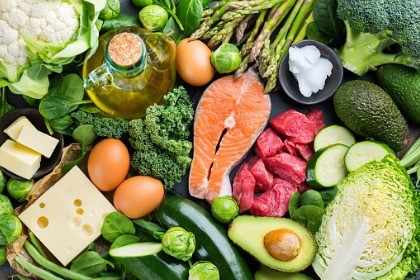
Ketogenic is a way of eating which is very low in carbohydrates, moderate in protein, and high in certain kinds of gut- and brain-healthy fats. It differs from other low-carb ways of eating such as Paleo and Atkin’s in that individuals who employ it often have specific goals other than weight loss and general health.
Eating “keto” switches the body from burning glucose for fuel to burning fat for fuel. Without carb-heavy energy sources such as bread, the liver will begin to convert fat stores into fatty acids, which eventually become substances called “ketones.”
Some individuals who are going through a healing journey with a major disease such as cancer may decide to go long-term with keto during the course of their healing [1]. Other people choose to follow a ketogenic lifestyle periodically or for a limited period of time to achieve specific goals.
Even when you eat ketogenic for a relatively short period of time, though, the positive effects can be noticeable. One study published in the Annals of Internal Medicine followed two groups of overweight individuals with high cholesterol levels.
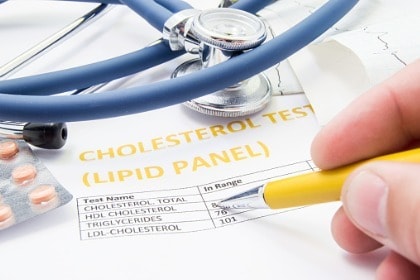
The first group participated in a low-fat diet for 24 weeks. The second group participated in a low-carb ketogenic diet for the same amount of time. Both groups lost a substantial amount of body mass, although the low-carb group also saw their cholesterol levels balance out overall [2].
What Is Intermittent Fasting?
Intermittent fasting (IF) means that you do not consume solid food for a period of time – often at least 14 hours, and sometimes up to 20 hours a day. Most individuals on IF go from between 14 to 16 hours without eating, which can easily be done by skipping either breakfast or dinner.
For example, if a person chooses to skip eating at the typical breakfast time, they can stop eating by 8pm the night before and not resume eating until 10am, 11am, or even noon the next day.
Studies in recent years have also shown that intermittent fasting as well as practicing calorie restriction overall can be incredibly beneficial, especially as we age [3, 4]. Although research continues, the general consensus is that there may be a LOT of mechanisms in the body that kick in during this kind of fasting. For example:
- IF balances out of insulin levels.
- IF raises Human Growth Hormone (HGH) levels, which help with weight loss, muscle repair and gain, and much more [5].
- IF lowers inflammation.
- IF assists in gut healing and repair.
- IF leads to cellular repair in the form of autophagy (a process where cells recycle themselves to remove mechanisms such as proteins which may be defective or worn out) [6].
- If can lend to gene expression that is favorable to longevity.
Why Bone Broth Is So Great for the Ketogenic Diet and Intermittent Fasting
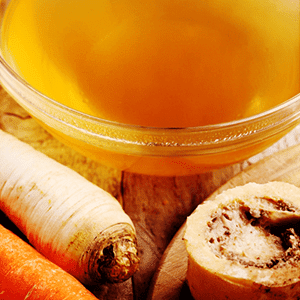
As we shall see, bone broth is a terrific supplemental food source if you’re eating ketogenic, if you’re doing intermittent fasting, and if you’re doing both. Combining intermittent fasting with a ketogenic diet is becoming very popular. And bone broth can be a great tool for both [7].
The Best Bone Broth for Keto
As an animal-based food, bone broth contains almost no carbohydrates which makes it perfect for a ketogenic diet.
If you choose to make bone broth at home, there may be a few carbs from the vegetables you use in the broth. These are likely very minimal or you could choose to only use low-carb vegetables such as celery for flavoring.
There are also flavored bone broth powders available on the market that may contain carbohydrates. Be sure to check the label if you are carefully tracking your grams of carbohydrates.
Bone Broth & Intermittent Fasting
Bone broth can be a powerful nutritional source when you’re fasting. If you sip a cup or two, it will not throw off autophagy nor all the other health benefits that fasting can provide. For many people, consuming a hot cup of bone broth can help them overcome the mental challenge of fasting, especially in the beginning.
Bone broth also contains electrolytes to help with dehydration and energy. What’s more, fasting with bone broth can be extremely healing for the gut since it helps lower inflammation and can also help seal the gut.
There’s a reason why many experts refer to bone broth as “liquid gold.” It’s nutrient-dense, especially when it comes to essential minerals such as selenium, potassium, calcium, and magnesium [8].
Bone broth is also collagen-rich, which means it is full of amino acids that can boost the immune system and help prevent disease [9]. Collagen also supports the gut, bones, joints, teeth, and major organs such as the heart, kidney, and liver.
Bone marrow (what seeps into the broth as bones are boiled) is also rich in fatty acids, which makes it the perfect companion when you’re in ketosis [10]. Remember what we discussed about fatty acids above? They’re what the liver turns fat molecules into on their way to becoming ketones.
Fat in Bone Broth: Tips for Consuming it Safely
There’s no doubt that bone broth can be an amazing nutrient source for intermittent fasting all around. The fatty acids along with other substances in this elixir can also help you stay in ketosis.
But what about all the other fat in bone broth? Can you eat it and will it help you stay in ketosis? The answer is a bit complicated. Yes, you can, but there is some information, as well as some precautions, you need to know first.
Once you are done making your bone broth and it begins to cool, you will notice that the fat that has seeped out of the marrow and other sources will begin to rise to the top, creating a semi-hard layer just above the gelatin. That is the fat layer we are talking about, just to be clear.
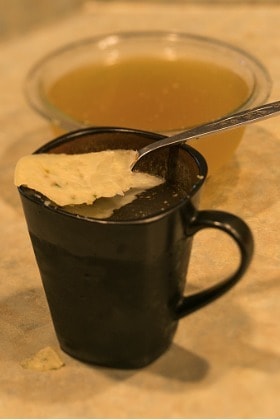
Most of the animal fat in bone broth comes in the form of a mixture of saturated and unsaturated fat, as well as linoleic acid. High temperatures, long durations of cooking, and exposure to oxygen may make it oxidize.
Oxidized fats are bad news, but there may be a way to avoid this in your bone broth. The first way is to simply skim off the fat on the top and consume the super-nutritious gelatinous part of the broth only (warmed up of course).
If you would like to use and consume the top layer of fat on your bone broth, here are a few tips to help you do so safely:
- Never consume a bone broth if it smells “off.” This is a sign that the fat may have gone rancid.
- ALWAYS use bones that come from 100% grass-fed, organic, hormone and GMO-free animal products. As a side note, pork bones are not recommended for bone broth because it is often difficult to find pork that is 100% free from hormones and antibiotics [11].
- Another option is to use an Instant Pot or pressure cooker to make your homemade bone broth. These kinds of cooking appliances will reduce the amount of oxygen your broth will be exposed to while it is simmering.
Of course, you can also go the easy route and use the keto-friendly Organixx Clean Sourced Collagens instead, a complete protein containing GMO-free chicken and bovine bone broth, which is great for getting in the bone broth nutrition you need.
If you are utilizing the ketogenic diet and/or intermittent fasting for your health, be sure to make bone broth a staple in your diet. Your body will thank you!
Organixx Clean Sourced Collagens blend contains five types of collagen from four sources. What’s more, it’s combined with targeted nutrients such as zinc, vitamin C, and vitamin B6 which specifically enhance the bioavailability and potency of collagen. Clean Sourced Collagens is formulated from the ground up to enhance and support your body’s natural ability to heal and rebuild itself from the INSIDE out.

 Sources:
Sources:
Article Summary
Bone broth for keto (i.e., the ketogenic diet) and intermittent fasting go well together.
Ketogenic is a way of eating which is very low in carbohydrates, moderate in protein, and high in certain kinds of gut- and brain-healthy fats.
Intermittent fasting (IF) means not consuming solid food for a period of time – often between 14-20 hours a day.
As an animal-based food, bone broth contains almost no carbohydrates which makes it perfect for a ketogenic diet.
Bone broth can also be a powerful nutritional source when fasting. It contains electrolytes and sipping some bone broth when needed won’t diminish the positive benefits of fasting.
3 safety tips regarding the top layer of fat that forms on your homemade bone broth:
- Never consume if it smells “off”
- ALWAYS use bones that come from 100% grass-fed, organic, hormone and GMO-free animal products
- Use an Instant Pot or pressure cooker to make bone broth to minimize oxidization


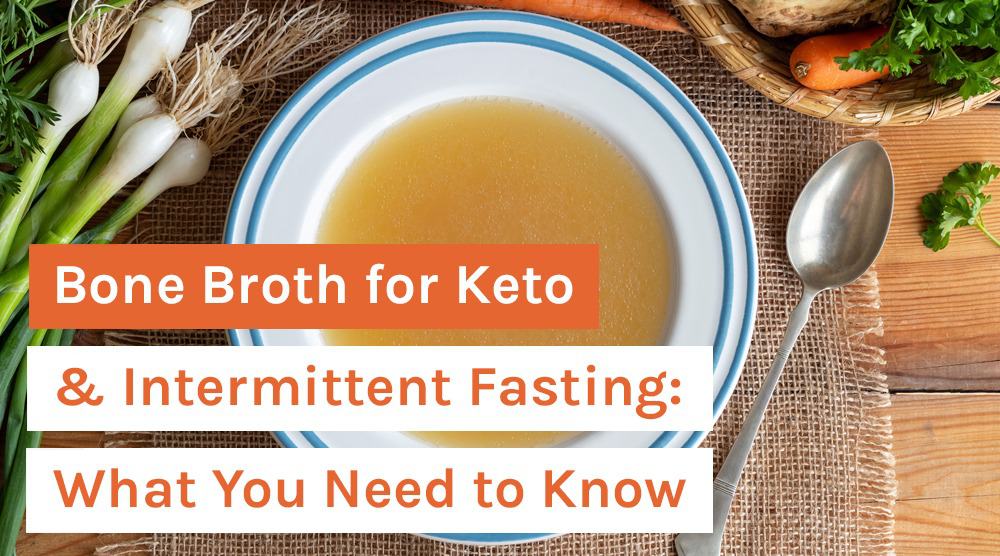


I’m on IF just started and during my window for eating I’m eating better and reducing calories when should I drink my bone broth?
Hi Diane Atkins, thanks for your question.
There isn't a specific time of day that you should drink your bone broth while intermittent fasting. In fact, if you sip a cup or two, it will not throw off autophagy nor all the other health benefits that fasting can provide.
If you scroll all the way to the end of the article, right above the Article Summary, you should see " ^ Sources". If you click on the (^) right next to sources it will give you a list of resources used for this article that will be quite beneficial.
We hope this helps and wish you all the best on your health & wellness journey!
I am presently looking into the ketogentic diet plan. I've never been on a diet before,so I want to know all the long term effects an so forth. How this will aid me while being an Epileptic , i want make that there' no side effects that could be harmful for me.
Hi Jo-anne, thank you for being here with us.
Unfrotunately, Organixx cannot diagnose, treat, or give you advice regarding your health and diet. We recommend relaying your concerns to a trusted medical and nutrition specialist, in order to help you determine if the Ketogenic Diet Plan is beneficial for you and your health needs.
We wish you the best in your wellness journey!